Mini Trucks: The Ultimate Farm Work UTVs?
When there’s work to be done, which is the better choice: a regular UTV or a Japanese mini truck? The answer depends on your particular situation but keep reading to find all the information you need to make the right decision for your farm or ranch.
Jump To Section
A major part of farming is having the right tools for the job, and whatever you use to get around your property, that will be just as much one of those tools as your tractor or combine. Now, whether you’ve been using a UTV, or even if you’re already using a mini truck, you know how much you rely on it—when you’re fixing fences, hauling rocks, checking on the fields—day in and day out. It’s not just about getting you around; it’s an essential tool to help you get that day’s jobs done.
So, when it comes to picking that perfect off-road work solution for your farm or ranch, there are a few critical factors that you need to look at. From hauling capacity to comfort, reliability, and versatility, every detail matters when you depend on it to get the job done. So, let’s look at a few reasons why mini trucks might just be the best choice for your farm or ranch.
Engine Performance & Efficiency
Power & Torque: Let’s face it—power and, more importantly, torque are everything when it comes to towing or traversing tough terrain. Whether you’ve got bags of feed or rocks loaded up in the bed, or whether you’re towing equipment across rough ground, you need that push of low-end torque to get the job done. Mini trucks might not be the absolute most powerful work UTVs out there, but their engines sit at the upper end of the range for this class. When paired with a manual transmission and a hi-lo range gearbox, their 660 cc gasoline engines deliver strong, consistent pulling power. They pull hard, keep traction where it counts, and won’t let up—even after long, demanding days in the field.
Fuel Efficiency: With the roller coaster ride that fuel prices have been on in recent years, you’re already well aware of how unpredictable and high gas prices can be—and how quickly those costs can chip away at your revenue. There’s no crystal ball to predict where prices will go next, but there is one thing that’s certain: the less fuel you use, the less money you’ll spend. Now, a typical work UTV averages around 20 MPG (for example, the Kawasaki Mule Pro-FXT averages around 23 MPG). On the other hand, Japanese mini trucks regularly achieve well over 35 MPG. That’s not just a small difference in efficiency—it’s a major cost saver. Even if you’re not putting thousands of miles on your Japanese mini truck every year, these levels of fuel savings really do add up over time. Over the lifespan of your mini truck, this difference can translate into hundreds, if not thousands, of dollars saved, making a real impact on your farm’s operating costs.
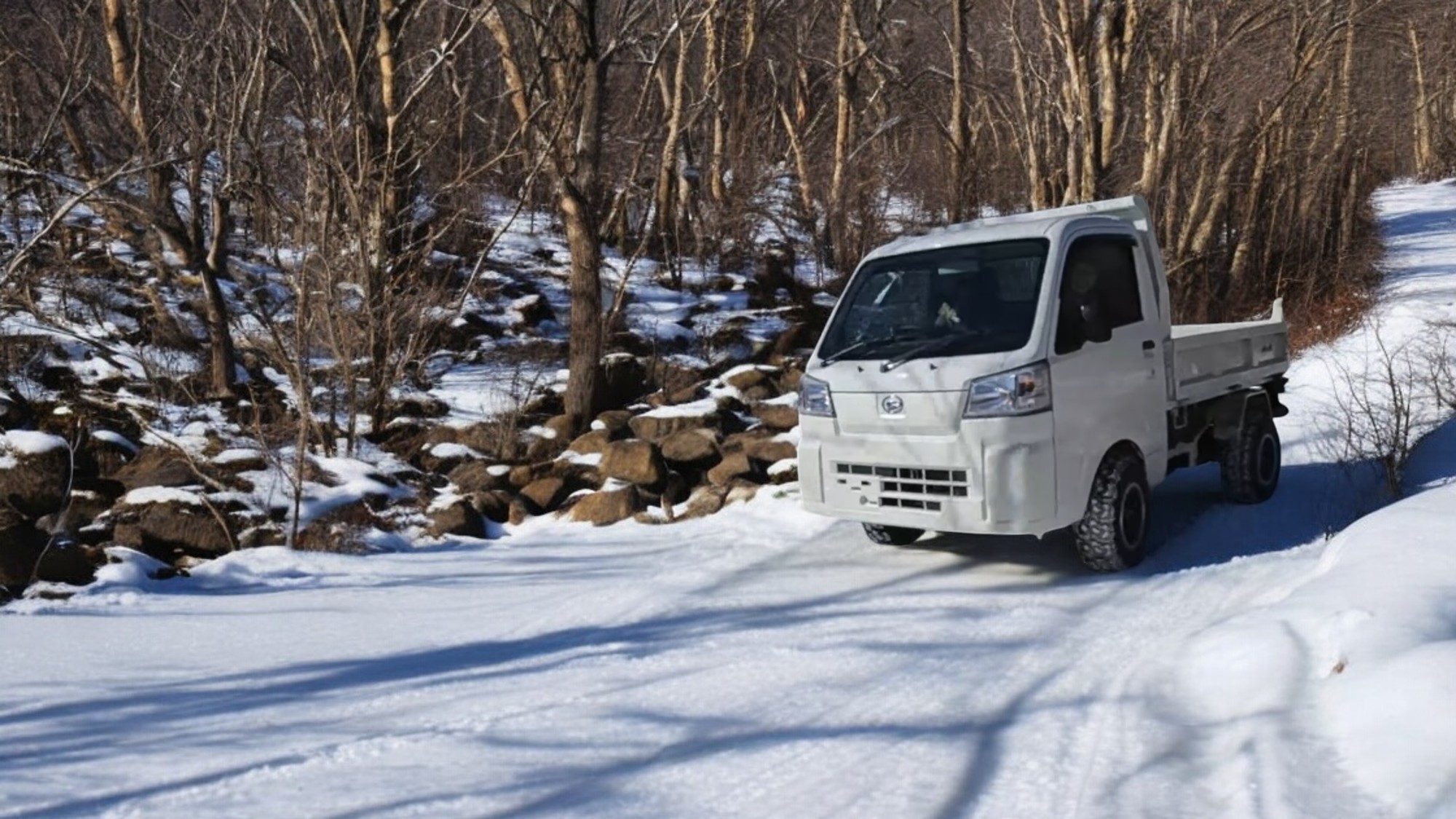
Durability, Maintenance & Build Quality
It doesn’t matter what you use to get around your farm if it breaks down or otherwise cracks under the pressure of real work. At the end of the day, you’re looking for a tool, not a toy. Established UTV brands like Can-Am, Kubota, and John Deere have built strong reputations for toughness over the years on exactly this premise. They’ve been around long enough to prove themselves, and while people have their preferred manufacturers, you don’t earn a name in the US off-road work UTV market without delivering reliable performance time and time again.
So, what about mini trucks? Just because they’re not as well known here doesn’t mean they lack toughness or reliability. Japanese mini truck manufacturers have been refining their designs for decades, producing them by the millions for demanding users. These trucks aren’t built for recreational use—they’re designed for Japan’s farmers, fishermen, foresters, and countless other workers who rely on them in physically challenging environments.
Consider Japan’s geography: a long, narrow country with conditions ranging from harsh, snowy winters in the north to hot, humid summers in the south. Add in steep mountain ranges, dense forests, and rugged rural areas—and remember, Japanese mini trucks are built to handle it all. They’re engineered for durability, no matter the terrain or climate. And when it comes to reliability and build quality, the names behind these mini trucks speak for themselves. Whether it’s Suzuki, with the Carry, or Daihatsu—fully owned by Toyota—their reputations for design, engineering, and long-term dependability are well established and formidable.
Summary: Mini trucks might be new to you, but they offer all the durability, reliability, and work-ready toughness you need in a tool for your farm or ranch— and have proven records with countless users over many years.

Ease of Maintanance
Even the best tools need regular care, and sometimes they need repairs. But when work is piling up, the last thing you want is maintenance time eating into your already packed schedule. The key is simple: less frequent scheduled maintenance time, and then less work to do when maintenance is needed. In this regard, both work UTVs and mini trucks are designed with practicality and ease of maintenance in mind.
For example, Japanese mini trucks like the Daihatsu Hijet offer easy access to key components. The engine is easily reached by just flipping up the front seats, which makes routine tasks like adding oil, changing the oil filter, or performing other basic maintenance quick and simple.
So, when it comes to the question of maintenance, it’s a pretty even match. Whether you choose a typical work UTV or a kei truck like the Hijet, you’ll get a UTV that’s designed with ease of maintenance in mind, allowing you to keep it running smoothly with minimal downtime and effort.
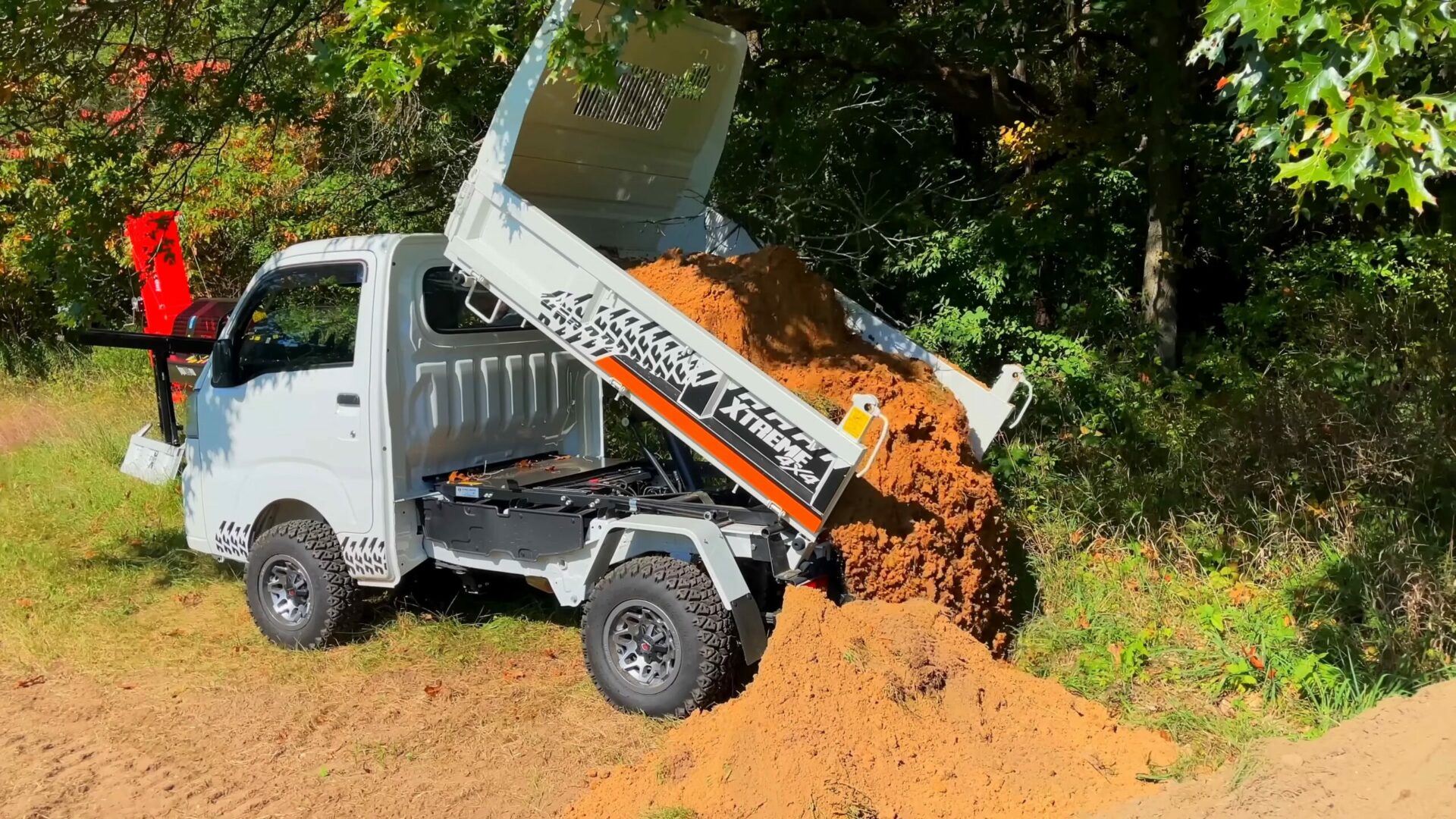
Terrain Adaptability
Wherever you’re farming, you’re going to encounter a variety of off-road terrain all the time as you move around your property. Whether it’s a muddy field, a grassy bank, a rocky track, or any other kind of challenging surface, whatever you’re driving is going to put to the test in a myriad of ways. Now, grip, ground clearance, and suspension are the top three factors that determine off-road performance, but having strong torque and lower gearing for those moments when you need extra pulling power is equally important.
Although they’re not the most powerful work UTVs, Japanese mini trucks definitely check all these boxes. All the mini trucks for sale here come equipped with 4×4 powertrains, that give you a really solid platform for off-road traction. There are also many models that feature a locking rear differential, giving them better ways to get the power down when driving in slippery conditions. When you combine this with knobby off-road tires and lifted suspension, then you have this mini truck that not only achieves excellent levels of traction but that also treads lightly—an important factor if you want to avoid damaging turf, for example. The added ground clearance also helps navigate rocks, deep ruts, and other obstacles without bottoming out.
Overall, mini truck owners will tell you they enjoy a comfortable, well-damped ride. The only slight drawback for some models is the use of leaf spring rear suspension instead of regular dampers. In most situations, you won’t notice much of a difference, but on very uneven terrain, it can feel a bit more bouncy, especially when there’s no load in the bed.
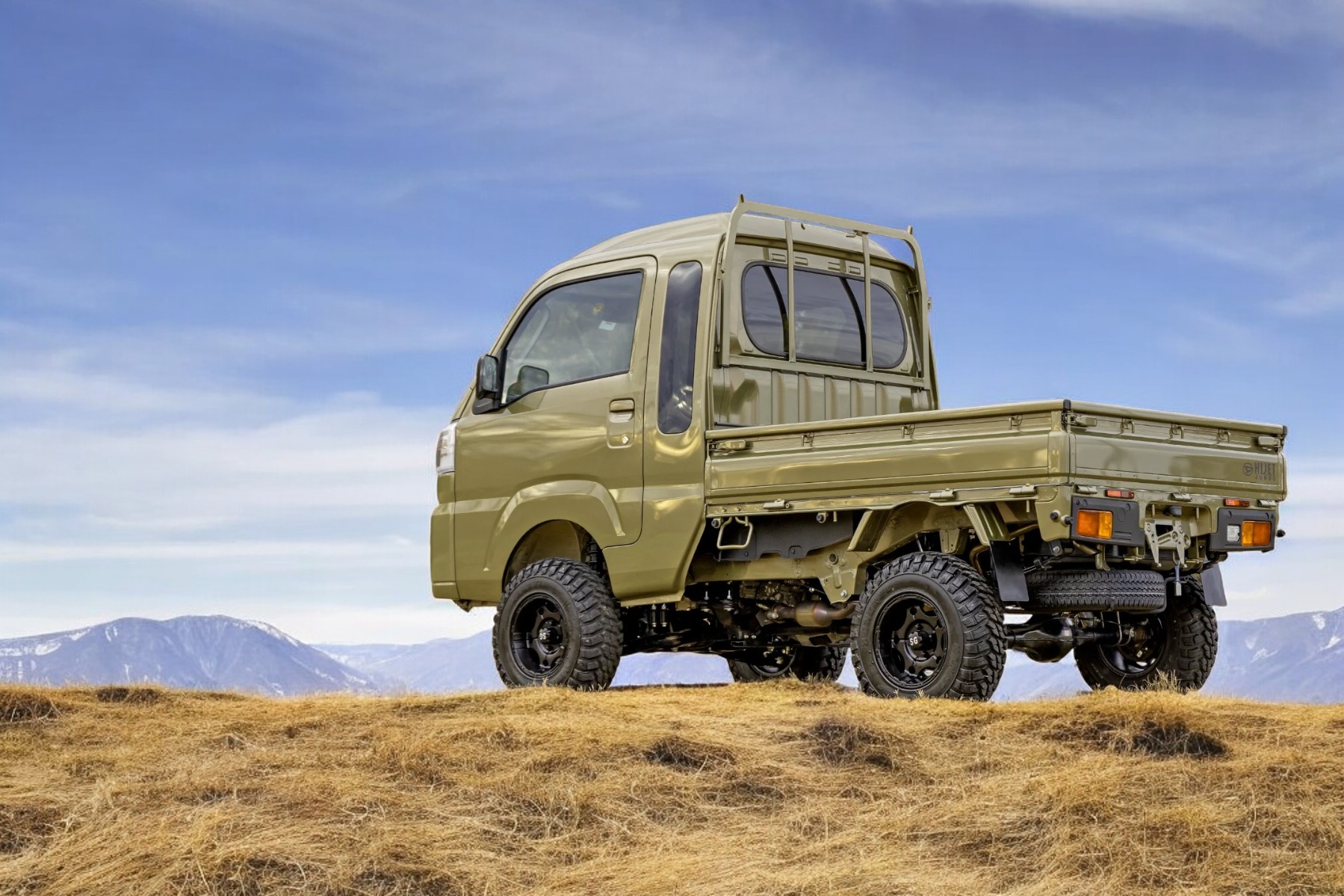
Load & Towing Capacity
Your mini truck isn’t just for getting you from A to B off-road—it’s also built to carry passengers, tools, equipment, and whatever materials you need to haul, like rocks, fence posts, or bags of feed. This ability to haul and tow is another area where mini trucks really shine.
Need a big bed to handle larger items? Depending on the model, you’ll get up to 6 feet 8 inches of bed length, providing plenty of space for long or bulky loads And if those loads are heavy? Our regular cab and Jumbo cab mini trucks can haul up to 1,000 lbs with ease. For even heavier loads, the HD Dump model with it’s reinforced steel box steps up with a 1,500 lb capacity. Loading and unloading are simple and easy on your back: all of these models feature drop-down bed sides and tailgates, making it easy to access your cargo from any angle. And if you need to spread feed or dump gravel? That’s exactly what the dump mini trucks are designed for.
But hauling isn’t the whole story. What about towing? Well your mini truck has you covered there, too. Equip it with a 2-inch Reese receiver receiver hitch and it’s compatible with a wide range of towing accessories, allowing you to hook up a trailer and tow up to 1,000 lbs. (Of course, that’s not with an additional 1,000 lbs loaded in the bed at the same time—these mini trucks are tough, but even they have their limits.)
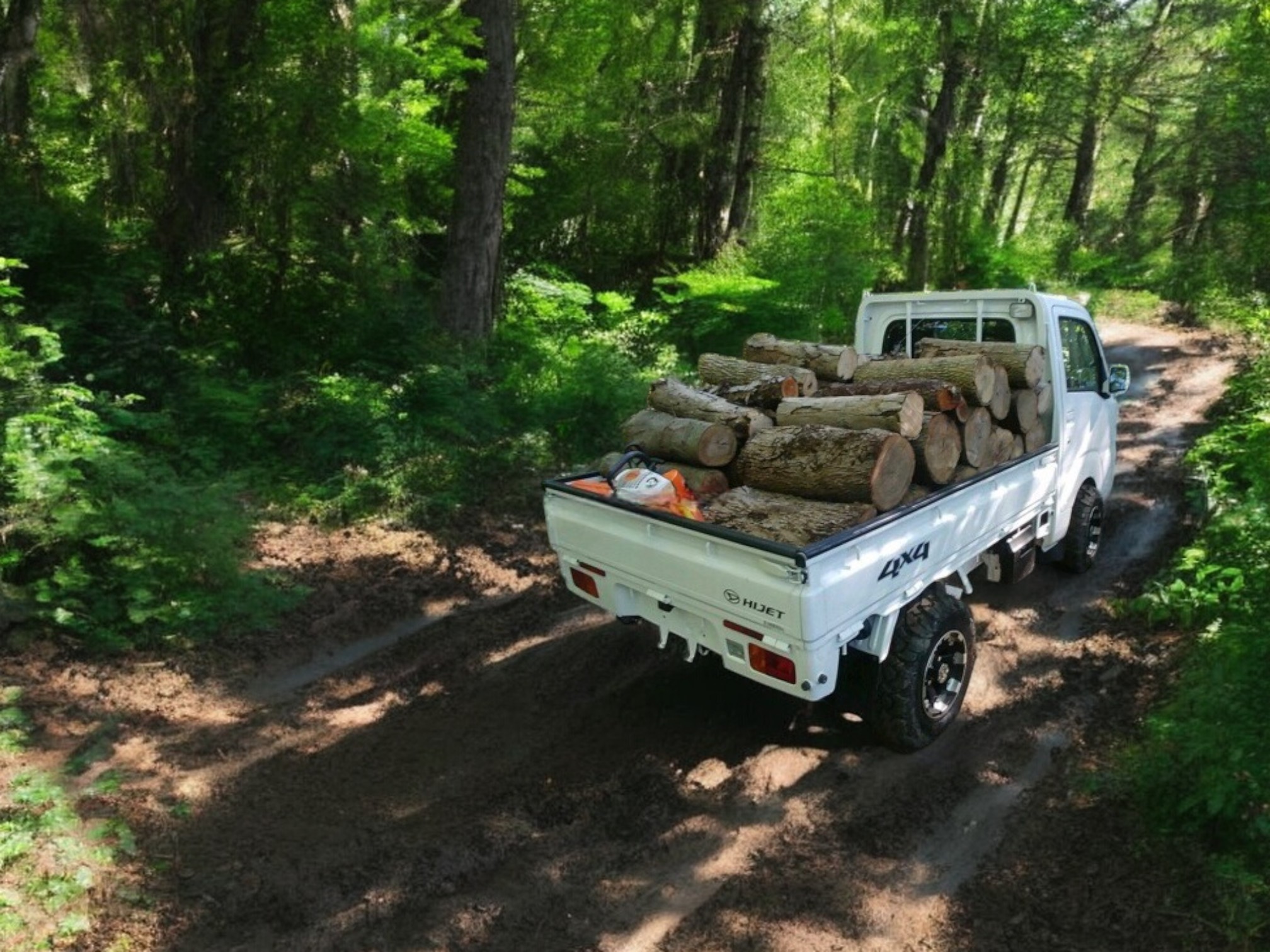
Comfort & Ergonomics
Just because you’re working hard doesn’t mean your work has to be hard—at least not unnecessarily so. This is something that often gets overlooked when choosing a work UTV. It’s easy to get caught up in the specs—power, fuel economy, towing capacity—all important numbers. But what’s often forgotten is how it feels to use this tool every single day. Think about how many hours you spend out in the fields, driving around your property. Now consider the conditions: rough terrain, unpredictable weather, and the constant drone of the engine as well as vibrations that may not seem such a big deal at first but can wear you down over hours of work.
Now, mini trucks tackle all these comfort challenges head-on. So, first, let’s talk about weather protection. Every mini truck comes with a proper weatherproof cab. Their doors and windows aren’t afterthoughts or extra-cost add-ons—they’re integral to the design and built into the price. The cab itself is constructed from steel with weather-proof rubber seals, ensuring no wind or rain leaks in. No matter what Mother Nature tries to throw at you, you’re well-protected inside.
The mini truck’s solid construction also contributes to the excellent ride quality. In fact, many mini truck models feature fully independent suspension with springs and dampers at all four corners, while others combine this setup with leaf springs at the rear. It’s true that models with leaf springs can feel a bit bouncier, especially when unladen, but that’s the trade-off for increased load-carrying capacity. Fortunately, the well-designed seats help absorb much of any bouncing that does occur. In particular, the reclining seats found in models like the Jumbo, Deckvan, and Cargo are exceptionally comfortable, providing the kind of support that makes long hours out in the fields feel much more manageable.
Noise insulation is another area where mini trucks excel. This might not seem like a top priority for an off-road work conveyance, but after a few hours spent driving across fields, the difference becomes crystal clear. Living with the quieter mini truck engine compared to the louder, more aggressive noise of a typical UTV engine can be the difference between feeling refreshed even after many hours off-road, and ending the day with a pounding headache. Even from the outside, mini truck engines are quiet enough not to spook thoroughbred horses. Inside, the cab also benefits from NVH (noise, vibration, harshness) reduction measures that create a calm, comfortable environment. It’s quiet enough to prevent fatigue—and more than quiet enough to enjoy your radio without having to crank the volume.
But comfort isn’t just about seating and noise reduction. Another common complaint owners raise about many regular work UTVs is how jerky their transmissions can be. This isn’t just about how comfortable they are to drive—though no one enjoys a rough, jerky drive—it’s also about getting the job done efficiently. For example, backing up to hook up a trailer with a jerky transmission can be far more frustrating than it needs to be. Mini trucks, on the other hand, offer smooth, responsive transmissions across all models. This is especially true for CVT models, which don’t require any gear shifting at all.
For all these reasons, mini trucks excel when it comes to daily comfort—an often overlooked factor when choosing a work UTV for your farm or ranch.
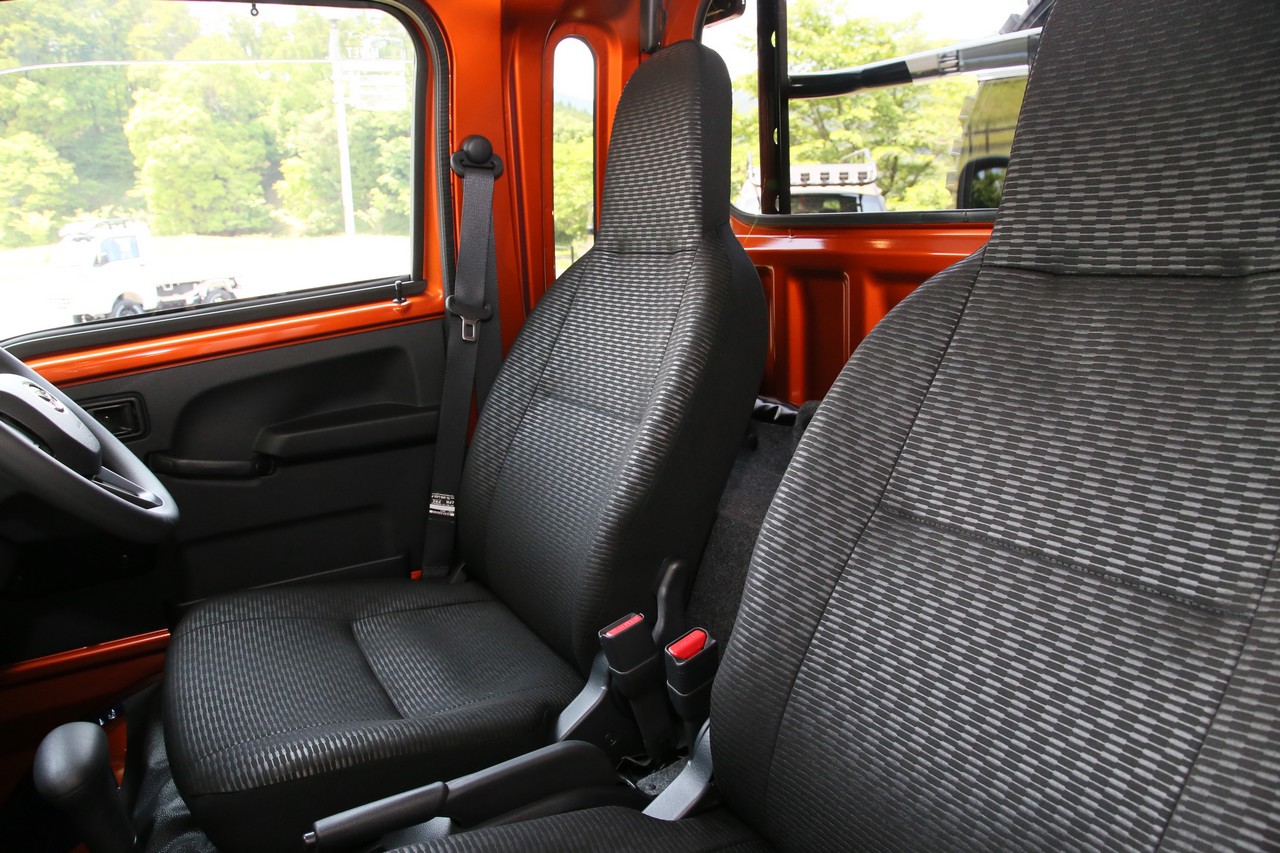
The Bottom Line: Why Mini Trucks Make Sense
To sum up, mini trucks have all the features you’re looking for in a work UTV for your farm or ranch—durability, power, comfort, and versatility. In fact, they might just be the ultimate solution for getting around your farm or ranch. But before we wrap up, there’s one more thing to consider: price.
Clearly no matter how great mini trucks are as workhorses around your farm, it won’t matter if the price isn’t right. Margins are tight, and there’s no room for unnecessary luxuries that don’t pull their weight. This is where things get really interesting. While the prices of well-known UTV brands have been steadily climbing for years—often outpacing inflation—mini truck prices have remained remarkably stable. And on top of this, Japanese mini trucks were already more affordable to begin with.
So, when you compare a typical work UTV to a mini truck, you load up both with similar features (many of which already come as standard on mini trucks), and then you factor in the long-term cost of each, the value difference is striking. You’ll see just how many thousands of dollars you can save by choosing a mini truck—without sacrificing reliability—while gaining in comfort and capability.
Want to see for yourself? Take a look at the different Japanese mini trucks for sale here.

